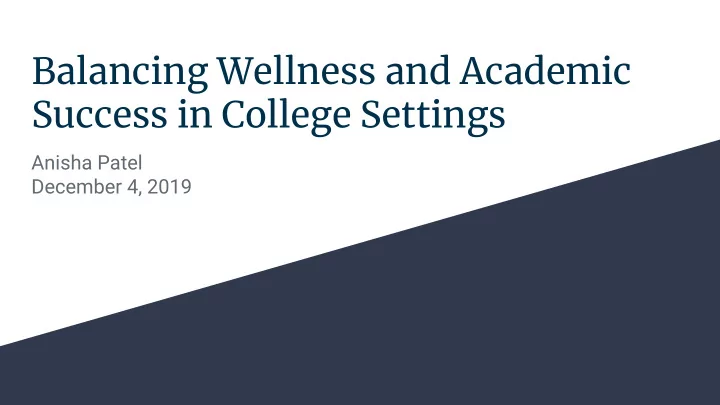

Balancing Wellness and Academic Success in College Settings Anisha Patel December 4, 2019
The Leadership Scholars Certificate Program is a two-year selective, interdisciplinary certificate program that prepares Rutgers undergraduate women to be informed, innovative, and socially responsible leaders. Leadership Scholars design and implement social action projects to expand their understanding of issues and problems and to develop leadership skills. This project gives Scholars the opportunity to apply the theoretical knowledge they have gained about leadership, advocacy, and social change with the practical and experiential knowledge they have developed about a particular policy issue or problem through the field site placement. It also further develops leadership skills by giving undergraduates the opportunity to practice leadership through action. To find out more please visit the Institute for Women’s Leadership’s website at http://iwl.rutgers.edu.
What is Wellness?
The 9 Dimensions Combination of ★ physical, mental, and spiritual well-being A process that takes ★ conscious efgort Source: Honors College Wellness Committee
52% Of students experience high levels of stress during a typical semester Hudd, et al., 2000
High levels of stress lead to... Dismissal of the need to eat a balanced diet, get enough ★ sleep, and avoid smoking and drinking (Hudd, et al., 2000) Anxiety, mood changes, and conflict in relationships (Britz & ★ Pappas, 2010) These behaviors increases risk for developing additional serious health issues, including heart disease and lung problems
So what can we do? Educate- workshops and health fairs are efgective methods ★ of health education (Kloss, et al., 2016; Dillon & Sternas, 1997) Students consider peer educators to be credible sources ○ for health-related information (Zullig, et al., 2012) Recognize and address barriers to access ★ Target at-risk students ★ Women are more likely to experience stress, and these ○ stressors are gender-specific
Promoting Wellness in the Honors College ー a first-year residence hall
Building on last year’s framework Incorporating Rutgers ★ resources HOPE programs ○ Rutgers Recreation- ○ Wellness on the Go Intentional activities ★ Targeting each dimension ★ of wellness
Gratitude Wellness Fair Mason jar Boxes In Action Coin Banks
Moving Forward - Implement programs in ★ first-year residence halls on Next Semester College Ave Campus Specific to the needs of ○ each community Reach those without prior ○ interest in wellness Create a resource sheet ★ summarizing Rutgers health resources and their potential costs
Feminist Leadership
Lessons Learned Your first idea isn’t always the Personally connecting people to ★ ★ best idea resources is incredibly efgective Not everyone will share your Starting a conversation will ★ ★ vision create momentum People will steal your spotlight People around you want to see ★ ★ you succeed Backup plans are vital ★ Promoting wellness to others ★ forced me to prioritize it for myself as well
Sustainability Planting the seed now means it ★ will bloom after I have left HC Student Wellness ★ Committee will continue to build upon the Wellness Fair They can use my mistakes ○ and successes to improve it even more In the future ー spreading the ★ message to more communities at Rutgers
Bibliography Brindis, C., Freund, K., Baecher-Lind, L., & et al. (2017). The risk of remaining silent: Addressing the current threats to women's health. Women's Health Issues, 27 (6). Britz, J., & Pappas, E. (2010). Sources and outlets of stress among university students: correlations between stress and unhealthy habits. Undergraduate Research Journal for the Human Sciences, 9 Cook, K. A., Woessner, K. M., & White, A. A. (2018). Happy asthma: Improved asthma control with a gratitude journal. The Journal of Allergy and Clinical Immunology: In Practice, 6 (6), 2154. Dillon, D., & Sternas, K. (1997). Designing a successful health fair to promote individual, family, and community health. Journal of Community Health Nursing, 14 (1). Escoffery, C., Miner, K., Adame, D., Butle, S., McCormick, L., & Mendell, E. (2010). Internet use for health information among college students. Journal of American College Health, Gaultney, J. (2015). Risk for sleep disorder measured during students’ first college semester may predict institutional retention and grade point average over a 3-year period, with indirect effects through self-efficacy. Journal of College Student Retention: Research, Theory & Practice, 18 (3) Hudd, S. S., Dumlao, J., Erdmann-Sager, D., Murray, D., Phan, E., Soukas, N., et al. (2000). Stress at college: Effects on health habits, health status and self-esteem . College Student Journal, 34 (2)
Biblipgraphy, cont. Kas-Osaka, C. N., Bradley, L. J., & Coffman, R. (2017). Developing online modules for a “Health and wellness” course: Adapting active learning strategies to the online environment. SAGE Journals, 4 (4), 254. Kloss, J., Nash, C., Walsh, C., Culnan, E., Horsey, S., & Sexton-Radek, K. (2016). A “Sleep 101” program for college students improves sleep hygiene knowledge and reduces maladaptive beliefs about sleep, Behavioral medicine. Behavioral Medicine, 42 (1) Lindley, L., .Brandt, H., Annang, L., Barnett, C., Hardin, J., & Burcin, M. (2009). Receipt of routine gynecological examinations among sexually active female college students in the united states. Journal of Women's Health, 18 (8) Maquet, P. (2001). The role of sleep in learning and memory. Science, 294 (5544) Murray, K., Liang, A., Barnack-Tavlaris, J., & Navarro, A. (2014).The reach and rationale for community health fairs . Journal of Cancer Education, 29 (1) Pilcher, J., & Walters, A. (2010). How sleep deprivation affects psychological variables related to college students' cognitive performance. Journal of American College Health, 46 (3) Wengreen, H., & Moncur, C. (2009). Change in diet, physical activity, and body weight among young-adults during the transition from high school to college Nutrition Journal, 8 (32) Zullig, K., Reger-Nash, B., & Valois, R. (2012). Health educator believability and college student self-rated health. Journal of American College Health, 60 (4), 296.
Recommend
More recommend